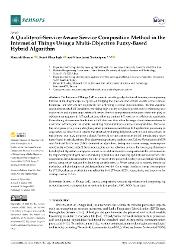A Quality-of-Service-Aware Service Composition Method in the Internet of Things Using a Multi-Objective Fuzzy-Based Hybrid Algorithm
| dc.contributor.author | Hamzei, Marzieh | |
| dc.contributor.author | Khandagh, Saeed | |
| dc.contributor.author | Navimipour, Nima Jafari | |
| dc.date.accessioned | 2023-10-19T15:12:06Z | |
| dc.date.available | 2023-10-19T15:12:06Z | |
| dc.date.issued | 2023 | |
| dc.identifier.issn | 1424-8220 | |
| dc.identifier.uri | https://doi.org/10.3390/s23167233 | |
| dc.identifier.uri | https://hdl.handle.net/20.500.12469/5343 | |
| dc.description.abstract | The Internet of Things (IoT) represents a cutting-edge technical domain, encompassing billions of intelligent objects capable of bridging the physical and virtual worlds across various locations. IoT services are responsible for delivering essential functionalities. In this dynamic and interconnected IoT landscape, providing high-quality services is paramount to enhancing user experiences and optimizing system efficiency. Service composition techniques come into play to address user requests in IoT applications, allowing various IoT services to collaborate seamlessly. Considering the resource limitations of IoT devices, they often leverage cloud infrastructures to overcome technological constraints, benefiting from unlimited resources and capabilities. Moreover, the emergence of fog computing has gained prominence, facilitating IoT application processing in edge networks closer to IoT sensors and effectively reducing delays inherent in cloud data centers. In this context, our study proposes a cloud-/fog-based service composition for IoT, introducing a novel fuzzy-based hybrid algorithm. This algorithm ingeniously combines Ant Colony Optimization (ACO) and Artificial Bee Colony (ABC) optimization algorithms, taking into account energy consumption and Quality of Service (QoS) factors during the service selection process. By leveraging this fuzzy-based hybrid algorithm, our approach aims to revolutionize service composition in IoT environments by empowering intelligent decision-making capabilities and ensuring optimal user satisfaction. Our experimental results demonstrate the effectiveness of the proposed strategy in successfully fulfilling service composition requests by identifying suitable services. When compared to recently introduced methods, our hybrid approach yields significant benefits. On average, it reduces energy consumption by 17.11%, enhances availability and reliability by 8.27% and 4.52%, respectively, and improves the average cost by 21.56%. | en_US |
| dc.language.iso | eng | en_US |
| dc.publisher | Mdpi | en_US |
| dc.relation.ispartof | Sensors | en_US |
| dc.rights | info:eu-repo/semantics/openAccess | en_US |
| dc.subject | Objective Deployment Optimization | En_Us |
| dc.subject | Ant Colony Optimization | En_Us |
| dc.subject | Resource-Allocation | En_Us |
| dc.subject | Mechanism | En_Us |
| dc.subject | Framework | En_Us |
| dc.subject | Model | En_Us |
| dc.subject | Internet of Things (IoT) | en_US |
| dc.subject | service | en_US |
| dc.subject | composition | en_US |
| dc.subject | heuristic algorithm | en_US |
| dc.subject | cloud computing | en_US |
| dc.subject | fog computing | en_US |
| dc.subject | service composition | en_US |
| dc.subject | meta-heuristic algorithm | en_US |
| dc.subject | ABC | en_US |
| dc.subject | ACO | en_US |
| dc.subject | fuzzy logic | en_US |
| dc.title | A Quality-of-Service-Aware Service Composition Method in the Internet of Things Using a Multi-Objective Fuzzy-Based Hybrid Algorithm | en_US |
| dc.type | article | en_US |
| dc.identifier.issue | 16 | en_US |
| dc.identifier.volume | 23 | en_US |
| dc.department | N/A | en_US |
| dc.identifier.wos | WOS:001056381100001 | en_US |
| dc.identifier.doi | 10.3390/s23167233 | en_US |
| dc.identifier.scopus | 2-s2.0-85168745998 | en_US |
| dc.institutionauthor | N/A | |
| dc.relation.publicationcategory | Makale - Uluslararası Hakemli Dergi - Kurum Öğretim Elemanı | en_US |
| dc.identifier.pmid | 37631769 | en_US |
| dc.khas | 20231019-WoS | en_US |
Files in this item
This item appears in the following Collection(s)
-
PubMed İndeksli Yayınlar Koleksiyonu [378]
PubMed Indexed Publications Collection -
Scopus İndeksli Yayınlar Koleksiyonu [2197]
Scopus Indexed Publications Collection -
WoS İndeksli Yayınlar Koleksiyonu [2113]
WoS Indexed Publications Collection
















